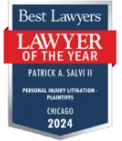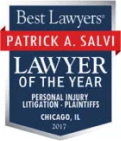(Marcie Mangan, Host) From the Chicago-land law firm of Salvi, Schostok & Pritchard, this is Beating Goliath: A Plaintiff’s Pursuit of Justice – Case #3, Part 1: Tierney Darden versus the city of Chicago.
(Trudy Darden) We had just come back from a trip from Minneapolis. My daughter was engaged, and we were looking at bridesmaids’ dresses. So, we were leaving the airport and we were going to the last street where you get to be picked up by people.
(Tierney Darden) I remember going out, and it was like slightly raining, and we were waiting for my dad to come pick me up.
(David Darden) At the time, I was heading there, started raining pretty hard.
(Trudy Darden) And then the storm blew in. It was very windy, very rainy, and we were seeking shelter. I thought, ‘Oh look, there’s a bus shelter, and we can’t go inside because the rain would come right in with us.
We’ll go on the other side because it’s a big heavy metal glass structure.’
(Tierney Darden) I think there was hail going on. I went behind the shelter, and I know we were laughing about something. And then next thing I know, I thought I heard a scream, and I thought it was my sister. Then next thing I know is I’m running, and I get hit in the head.
I see like a white flash, and then I’m on the ground, and my legs went completely numb.
(Trudy Darden) Literally, the next thing we know, this structure is falling on top of us, and then I looked over to see who was there, and my youngest daughter was gone. So I was like, ‘Okay, somehow she managed to bolt out of there.’, and there’s Tierney on the other end, and she’s crouched down.
She’s like on her knees, and she’s all crouched down and the structure is on top, but I’m yelling at her to get out, and she looks at me and she says, ‘I can’t feel my legs.’
(Tierney Darden) I don’t think I felt pain. It was more the tingling and then me knowing immediately that something was wrong, and I assumed it was me being paralyzed.
At one point, they tried to lift up the shelter and they kept telling me to crawl out and I told them I couldn’t move. I wasn’t able to move at all.
(Trudy Darden) At that moment, I knew something was horribly wrong.
(Tierney Darden) My little sister got like pissed off because some people were taking pictures and, you know, because, I mean, that’s what people do.
(Trudy Darden) Shortly thereafter, there were all these hands as they were picking up the structure, and of course, after they did that, she still couldn’t move, but we were afraid because I didn’t want the structure to fall down on her again. So. we did like pull her out to the street and again, not moving.
(David Darden) I got out of my vehicle, saw it into the, essentially, I guess the taxicab lane and saw the crowd of people around Tierney and Tierney on the ground.
I knew something bad had happened. We knew it was severe then. I mean, because she couldn’t get up, she couldn’t move. She was in a lot of pain lying there, very uncomfortable because of the rain. They, you know, put her in the the ambulance, took her to the hospital. She was there for about a week or so.
(Trudy Darden) It doesn’t matter how old your child is, you know, your child is gravely injured and going to see your child in an intensive care unit when there are tubes everywhere, instruments everywhere, machines everywhere, noises everywhere.
And you’re watching your daughter, who looks so small on that bed compared to all of the equipment, you’re always scared because you’re not in charge.
(David Darden) It wasn’t until later on, after they finished doing preliminary work, looking at her, that we knew actually how severe it was. She was paralyzed, wasn’t expected to ever walk again.
(Tierney Darden) I wasn’t surprised, but I was also upset because, you know, I had been dancing my whole life.
I love to walk. I knew I was paralyzed, but then telling me how severe it was and that like it wasn’t going to…I wasn’t going to get better like it crushed me.
(Trudy Darden) How did something that heavy that should have been bolted to the pavement fall on top of us? There’s no reason that that should happen.
(Patrick Salvi Sr.) My name is Patrick Salvi.
I am the managing partner at Salvi, Schostok & Pritchard. I was alerted to the fact that a serious case had come in, and I was asked to be part of a team to meet with Tierney at the hospital with her family and be interviewed for possibly being chosen as the law firm to represent her in a cause of action against whomever was responsible for this terrible tragedy.
(Trudy Darden) I just remember Mr. Salvi coming fairly recently after the accident and immediately again, because of his calm manner, it’s like, ‘Oh, okay, one less thing I have to worry about because he’s going to take care of that. I can now just focus on my daughter.’
(Patrick Salvi Sr.) The doctors knew that this was a severe permanent spinal cord injury that would result in permanent paraplegia.
It wasn’t a situation where they do an operation and you hope you get better. The injury to the cord was so severe that all they could do was decompress by a surgical procedure and to prevent any further swelling and damage, and stabilize the back so that she could begin rehabilitation.
(David Darden) Tierney’s early weeks, she started off at Lutheran General.
So, she was there for about a week or so, then went to what was then the Rehabilitation Institute of Chicago, RIC and is now known as Shirley Ryan Ability Lab.
(Trudy Darden) RIC was fantastic. We had to go there where they showed us how they taught her to do some things. So the process of getting in and out of the car, sometimes I didn’t know how to get her to certain, you know, on the toilet into the shower, those kinds of things.
(Tara Devine) I’m Tara Devine. I’m a partner at Salvi, Schostok & Pritchard. I work in Lake County as managing partner of our Waukegan office. I also was born and raised in Lake County and currently live there now. And so immediately, when I heard about this case, I knew where the family lived. I felt a greater connection. It was as if it happened to a neighbor that you grew up next to.
So, I was brought in because we knew that there was going to have to be a lot of client communication in client contact.
(Patrick Salvi Sr.) One of the most important things a lawyer can do is really get to know the plight, the day-to-day, the hardest things in terms of physically, emotionally, how you feel. You’ve got to spend the time to really know it, and then you’re in a much better position of presenting it.
(Tara Devine) I went to go see them at RIC before she even got released to go back home. She was just heavily medicated, kind of in and out of sedation.
(Tierney Darden) And at the beginning I was probably taking, I don’t know, maybe 10 to 20 different kinds of medicine. Most of it was probably opioids. So, my days were kind of blurred together and hazy.
(David Darden) There were neuropathic pain medications. There were pain medications. She was on a number of opioids, and because of the opioids that would throw off her intestinal system. So, she was on medications to help keep her from her stools clogging her up, for her being constipated and impacted. She was on bladder relaxants or bladder stimulants. She frequently would get urinary tract infections and then that would require antibiotics.
She was on supplements, anti-anxiety medications, you know, medications just to help her work through the day. I would say she was on at one time, she’d be on up to 20, 25 prescription medications.
(Tierney Darden) There were times when I would take the medicine and I would be still in so much pain that I would be crying for more because I thought that that was the only way to help suppress it.
And instead, it just made me more groggy, and I was falling asleep on people and I was literally staying in bed 24/7.
(Tara Devine) Once she’s discharged from rehab, you know, there were some wonderful volunteers that went to work on the house that her dad lived in, that David lived in, so that they could get it prepared. But that took, as you can imagine, weeks, if not months.
And so she lived for months, weeks upon weeks, at a hotel in Vernon Hills with her mom and her dad, you know, constantly there, and her mom would spend the night and they would stay there. And this hotel room was packed with medical supplies and diapers, and this was not a this was not a Four Seasons.
(Trudy Darden) Before the accident,
I mean, she was older. She was out of the house. She was independent. Afterwards, I’m living with my daughter for six months in a tiny little hotel room. We are sleeping in the same bed and I am taking care of bodily functions.
(Tara Devine) I would go visit, and there were clothes in there and medical supplies and food from the night before.
(Patrick Salvi Sr.) You go from normal where you’re happy go lucky, you’re dancing. You have your whole wonderful life ahead of you. You can just get up and go and do whatever you want, whenever you want. You don’t even give a second thought to, you just get up and go and enjoy life as a young, energetic, happy young lady.
To you know, every day is you have an exhaustive bowel program. You’re catheterized to urinate multiple times during the course of the day. Every day is just a struggle.
(Tara Devine) I remember Trudy telling me one morning, and Trudy looked like she had had a rough night, and I kind of said, like, ‘It looks like you’ve had a rough night, you know, is everything okay?
Like, what can I do, you know?’ And she said, ‘Do you know how hard it is to lay next to your daughter and listen to her cry herself to sleep at night?’ And it just resonated with me. Our plaintiff in the case was Tierney, but you almost wish that you could get something for what her parents went through. From the moment they woke up to the morning,
To, you know, the moment when they went to bed, their lives were turned upside down, too.
(David Darden) Once she got a little bit more stabilized a few weeks down the road, it was going to work. Going to see Tierney, checking on the family animals, making sure they were okay, sleeping, and then doing the whole same thing again.
(Tara Devine) This was no fairy tale recovery. It was a really hard road for all of them, and to say, like an adjustment is not the right word to use. What’s the hashtag now? Like girl dad or whatever. That’s what David was. He was a girl dad. As for the mom, Trudy, both of them would have done anything for any one of their daughters.
They showed that time and time again by showing up every single day and making sure that she was never alone.
(Trudy Darden) Tierney kind of wears her heart on her sleeve sometimes. I think she was very depressed.
(Tierney Darden) I didn’t really see much happiness in my life. It was slow moving, a blur. I was a sad person. I didn’t really care to do anything.
I didn’t care to work out. I didn’t care to take care of myself. I didn’t care to, you know, talk to people. What helped me fill the void the most was my family. They have been there since the beginning and haven’t left my side once.
(David Darden) There is not really much we can do for Tierney other than to be there for her.
(Tierney Darden) There will always be a part of me that was taken away and I can’t get back. Dance was like my whole life. I danced a lot before the accident. From my first recital on, I was like, hooked.
(Patrick Salvi Sr.) How sad it was to see a young lady whose main joy in life was dancing and wanted to operate a dance studio as a profession.
And of course, that was taken from her, but then was afflicted with this, you know, this terrible pain syndrome.
(Tara Devine) I do believe that had this happened to someone else who innately in their nature was not an optimistic, positive, love the world type of girl or young adult, like I could easily see other people throwing in the towel.
That wasn’t an option for her. And I knew it wasn’t an option for her, not because she physically or mentally wouldn’t have wanted to, truth be told. It was because the love that she had for those around her. She could never do that to her family. She would never do that to her parents, to her sisters, to her nieces and nephews.
She would not do that.
It wasn’t for several weeks, if not months, before I actually got like a small window into the real Tierney and how this was really impacting her and being able to have a conversation with the, you know, the daughter that her mom and dad knew her to be. She was a beautiful, you know, despite everything that she was going through, she just naturally has a light shining from within her.
Tierney, despite everything that she went through, I think her entire life, she was just someone who had a bright, shining light inside of her, I think. And I truly believe that it was her innate nature and positivity that got her through.
(Patrick Salvi Sr.) It was clear that the accident happened as a result of a failure to maintain and repair the shelter.
We knew the city owned and operated the airport. We weren’t certain whether any third party was involved, but we certainly knew that the city, ultimately, was responsible for the condition of the shelters. When you have a case like this and there’s no litigation, it’s not like a malpractice case where you can have the client sign authorizations and get medical records.
You can’t get the records from the city of Chicago or the airport. Well, unless you have a lawsuit. There was a meritorious basis to sue the city of Chicago at the very least, and that’s what we did.
(David Darden) This was something that was so avoidable. Proper maintenance of those shelters, and this wouldn’t have happened.
(Tierney Darden) I’m pissed. I’m upset that something that could have been fixed kind of ruined part of my life.
(Patrick Salvi Sr.) My job was to make assignments to the various members of the trial team in terms of who would do what.
(Eirene Salvi) My name is Eirene Nakamura Salvi, and I’m an associate attorney at Salvi, Schostok & Pritchard. The first time I met Tierney, I went to her house in Vernon Hills with Pat Sr. and Tara. She was really, really suffering.
I mean, it was really hard for her to even get out of bed to talk to us. There’s just something about Tierney that you can’t help but like. Tierney is just about a year younger than me, and we kind of listened to similar music, and we had some similar interests. To see her and get to know her as somebody who was more of my peer was an interesting experience, and it was certainly a motivating factor, just knowing that to have things, all of that taken away from you in an instant, it’s unimaginable.
(Patrick Salvi Jr.) I’m Patrick Salvi Jr., and I’m the managing partner of the Chicago office at Salvi, Schostok & Pritchard. My role on the trial team was to work with the rest of the team members in our strategy leading into the trial. I met Tierney about two years after she was injured. I went to her home. I was really in awe of her ability to converse with us, have a smile on her face.
Through the adversity she was facing, and to really be able to focus on the task at hand. Tierney was incredibly strong, and I learned that really within moments of meeting her.
(Eirene Salvi) We were really round tabling and kind of what the next steps would be and getting all of the information about Tierney’s continuing treatment because she had so many different doctors and all of these issues that were going on and really just kind of gearing up to do all the research and get our ducks, all the ducks in a row, and to have the city eventually admit liability.
(Patrick Salvi Sr.) We deposed virtually every person that could have anything whatsoever to do with that part of the terminal, the bus shelters, the maintaining of the bus shelters. We took dozens and dozens of depositions of employees of the city of Chicago who worked at the airport, and basically discovered that no one was responsible for checking these bus shelters. Everyone else thought some other department or person would do it.
(Tara Devine) There clearly was no routine designated individual to do inspections and maintenance on these shelters, and in essence, I think that their plan was when something breaks or falls down, you take care of it.
(Patrick Salvi Sr.) At the end of the day, the city was left with the decision of, ‘Hey, we throw up our hands and we are responsible. We accept liability.’
But they didn’t do it until we brought them to their knees.
(Eirene Salvi) The city of Chicago didn’t admit negligence until maybe six months before trial. It was a lot of work that went into this. They fought really hard against an admission of negligence, obviously, because they knew that this was a significant case with significant injuries and exposure for the city.
(Tara Devine) It was actually in the defendant’s best interest to admit liability. People, you know, jurors and laypeople think, well, you want people to admit liability, you know, that makes for an easier trial, and then you don’t have to worry about a not guilty. Yes and no. The disadvantage to the defendant’s admitted liability, though, is you don’t get to go into if it was egregious conduct or even like above and beyond, which in this case, we had to prove conscious disregard for the safety of others because it was against the city of Chicago.
(Eirene Salvi) We had our goals in mind set as to what the case was worth and, you know, we just didn’t really think that the city would come, you know, close enough for it to take care of Tierney or to fully compensate her for what they took away from her.
(Patrick Salvi Sr.) I didn’t really think the case was going to settle because I just think we were on different wavelengths in terms of the value of the case, what the appropriate compensation should be.
(Patrick Salvi Jr.) Their best settlement offer was in the $30 to $35 million range and never really indicated a willingness to go much above that. It became pretty evident that the two sides had just very different value propositions as to what an injury like this was worth.
(David Darden) I thought that their initial offers were low, especially once our Quality of Life report came out.
The expert had said, ‘You know, they will need this for the rest of her life.’
(Tara Devine) It wasn’t enough. We’re telling them, turn this away because we feel that we’re going to be able to get more from a jury and that the case is worth more than they’re offering.
(Patrick Salvi Sr.) The city was insured with a $500 million liability policy. So, it wasn’t a situation where, like in a police shooting, they have to go to the city council and get approval and say, ‘We’d like you to authorize that payment of X amount of dollars.’
This was insurance money. So, it was another reason why we really felt it was a very good case to try.
(Patrick Salvi Jr.) There really isn’t an amount of money that any human being would accept to have Tierney’s existence. The compensatory damages in a case like this ought to be extraordinary. The team was talking about potentially asking for as much as $100 million from a jury.
I asked the question, ‘Why wouldn’t we ask for $200 million?’
(Marcie Mangan, Host) In our next episode, Tierney’s attorneys prepare for trial and make their case against the city of Chicago, but will their arguments be enough to convince a jury to award her record-breaking verdict? Listen in to see if the trial team makes the right decision in turning down a multimillion-dollar settlement offer.
(Tara Devine) When you turn down a settlement, you do not know until you get a verdict if you made the right decision.
(Marcie Mangan) Special thanks to Tierney Darden for allowing us to share her story. You can find more episodes of Beating Goliath on Apple Podcasts, Spotify, or wherever you get your podcasts. To learn more about this case and our firm, head to www.salvilaw.com/podcast.









